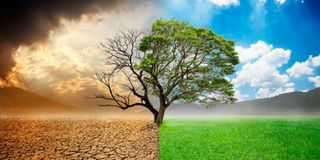Climate mitigation is for all

Although Africa has contributed a very small percentage of global greenhouse emissions, it has suffered disproportionately.
What you need to know:
- We talk passionately about the need for mitigation but often wait for others to take action.
- We pledge to engage actively but tend to contribute minimally to the actualisation of our plans.
Climate change is a huge threat to our planet’s ecosystems and human livelihoods. In Africa, discussions about climate change mitigation have been extensive with various measures proposed. But the disconnect between discourse and action remains a pressing issue.
With financial constraints, economic limitations and weak enforcement of legislation and policies cited as barriers, who bears the responsibility? It is crucial to identify the key actors in the fight against climate change. Have we embraced our roles as active participants in mitigation or merely spectators?
Greenhouse gases
Africa emits just four per cent of global greenhouse gases. But its climate burden chokes development, exacerbates poverty and threatens to push 86 million more Africans into poverty by 2030, compromising food security, diminishing access to clean water and degrading the quality of life on land.
One glaring paradox is our collective response to climate change. We talk passionately about the need for mitigation but often wait for others to take action. We pledge to engage actively but tend to contribute minimally to the actualisation of our plans.
Climate crisis
At the recent Africa Climate Summit, leaders emphasized the responsibility of the global community to fund mitigation efforts in Africa proportional to their contributions to the climate crisis. But the responsibility lies with all of us. It is the cumulative impact of our collective efforts, regardless of scale, that will drive meaningful progress in mitigation.
Moreover, we must critically assess the effectiveness of our environmental regulations. If they were sufficient, why are we grappling with polluted water bodies across the continent? This question accentuates the need for not only comprehensive legislation but also rigorous enforcement and proactive citizen engagement in environmental protection.
Africa’s unique vulnerability to climate change emphasizes the urgency of collective action.
Prof Wanjau is an associate professor at Karatina University; [email protected]. Ms Ayuma is a chemical engineer and environmental expert; [email protected].




